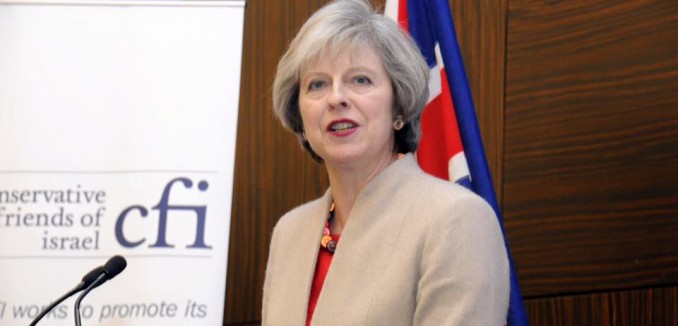British Prime Minister Theresa May praised Israel as “a remarkable country” on Monday, affirming her government’s commitment to bolster bilateral relations with Jerusalem and opposition to efforts to economically attack the Jewish state.
Her sweeping address before the Conservative Friends of Israel, which received a standing ovation, began with a reference to the 1917 Balfour Declaration, which pledged British support for a “national home for the Jewish people” in what is now Israel.
“It is one of the most important letters in history,” May announced. “It demonstrates Britain’s vital role in creating a homeland for the Jewish people. And it is an anniversary we will be marking with pride.” Her comments come in the wake of threats by Palestinian officials to sue Britain over the declaration.
PM May: "The #balfour declaration is one of the most important letters in history"; "it's an anniversary we will be marking with pride" pic.twitter.com/TADUT0yQS8
— Yiftah Curiel (@yiftahc) December 12, 2016
The prime minister then reiterated her nation’s commitment to a two-state solution between Israel and the Palestinians, to be reached through bilateral negotiations “without preconditions.”
“We have, in Israel, a thriving democracy, a beacon of tolerance, an engine of enterprise and an example to the rest of the world for overcoming adversity and defying disadvantages,” May said. “It is only when you walk through Jerusalem or Tel Aviv that you see a country where people of all religions and sexualities are free and equal in the eyes of the law. … It is only when you meet our partners in eradicating modern slavery – one of the main reasons I visited in 2014 – that you see a country committed to tackling some of the world’s most heinous practices.”
May further highlighted the extensive business ties between the UK and Israel, pointing out that Britain is Israel’s “number-one destination for investment in Europe,” with some 300 Israeli companies doing business there. She also noted that during this past year, Israel’s El Al airline chose to buy Rolls Royce engines for its fleet in a £1 billion deal, the largest ever between the two nations.
She added that these economic ties should be celebrated, and that the UK “should condemn any attempt to undermine that through boycotts.”
“I couldn’t be clearer: the boycotts, divestment and sanctions movement is wrong, it is unacceptable, and this party and this government will have no truck with those who subscribe to it,” May said. “Our focus is the opposite – on taking our trading and investing relationship with Israel to the next level.”
May continued by listing a number of examples of “Israel at its best.”
I think of the injured Syrians appearing at night at the Israeli border and being taken in and given treatment in hospital.
I think of the Israeli field hospital, which has saved lives from Nepal to Haiti, recently being rated the best in history by the World Health Organisation.
And I think of the project “Save a Child’s Heart”, which, as you saw in that video, conducts heart operations for children who would never be able to afford the treatment.
The UK similarly shows its commitment to the rest of the world by designating 0.7 percent of its national income to foreign aid, which helps save lives across the globe, May said. However, the government must be committed to ensuring that “the funds go to the right places,” she added.
“Let me be clear: no British taxpayers’ money will be used to make payments to terrorists or their families,” May emphasized, referencing an ongoing controversy over the alleged misuse of UK funds earmarked for the Palestinian Authority.
May credited International Development Secretary Priti Patel for urging a review of funding to the Palestinians to ensure that “every penny is spent in the right places and in the right way.”
“She is looking at options for the UK to support co-existence projects in the region – something I know so many people in this room have called for,” May added.
The prime minister also announced the adoption of a formal definition of anti-Semitism by the government, promising that anyone violating that standard “will be called out.”
“It is unacceptable that there is anti-Semitism in this country,” May declared, observing “that incidents are reportedly on the rise.”
Commentator Jonathan Sacerdoti explained that this definition will help establish “a clear line over what is and what is not legal” during a Monday interview with Sky News.
The British government’s adoption of a standard definition of anti-Semitism comes a week after Germany’s ruling party passed a resolution declaring that the Boycotts, Divestment, and Sanctions campaign against Israel “is nothing more than coarse anti-Semitism, as the National Socialists [Nazis] have already instrumentalized.”
[Photo: Conservative Friends of Israel ]




